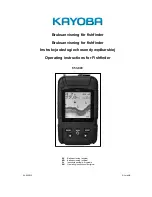
After the menu times out, the diagnostic screen will appear. Upon enabling diagnostic, the Wide
2000 will perform a self-test. This test confirms the operation of all internal circuitry. At the
conclusion of the test, one of two messages will appear on the left side of the screen; “passed”
indicates that the internal test discovered no failures. “Failed” indicates that a significant internal
problem was discovered and the unit will require factory service. In conjunction with the failed
indication will be a code which indicates to the repair personnel where the problem is.
Even if the self-test is passed, other messages may be present to indicate an abnormal situation.
Examples of these are high-voltage and low-voltage shut down indications. The Wide 2000 will
shut down to protect the inner circuitry if the input voltage exceeds 16 VDC or is less than 10
VDC. If either of these conditions cause the unit to shut down, a message will indicate this.
NOTE: Powering the unit off will reset these messages.
The right side of the Diagnostic screen evaluates external connections to the unit. The first
category is Transducer input. If a transducer is detected, a message will indicate the type of
transducer connected. This is an excellent way to confirm transducer connection. If a transducer
is connected directly to the unit, the connection will be indicated here. If a switch is used, use
Diagnostic to confirm the connections from each transducer. If a series of dashed lines is shown,
then no transducer is connected or there is a problem with the transducer or cable.
The next categories indicate the connection of boat speed sensor and surface water temperature
sensor. These accessory sensors can be purchased independently or together as a single sensor
(see Available Accessories). If the sensors are connected and working properly, a “connected”
message will appear.
Note: This feature only works when the boat is in motion, as the paddle wheel on the speed
sensor must rotate to be detected.
The voltage input category is especially helpful in diagnosing input voltage problems. The current
input voltage will be displayed. If voltage fluctuations or power supply in excess of 16 VDC or less
than 10 VDC is suspected, use the diagnostic screen to confirm input voltage. Often, small
outboard motors do not effectively regulate voltage when operated at high engine speeds. Use
Diagnostic while running the boat at high speeds to show the voltage gain. Also, if you are using
the Wide 2000 in portable configuration or from the trolling motor battery, Diagnostic can be used
to evaluate t he health of the battery by showing the current voltage.
The total time category indicates the total time the unit has been in use since shipped from the
factory. Note: It is normal for some hours to be indicated in the total time when the unit is new
due to factory testing.
While this is often of interest to the user, it is primarily a diagnostic tool for the repair technician
should service be required.
Содержание Wide 2000
Страница 1: ......




















